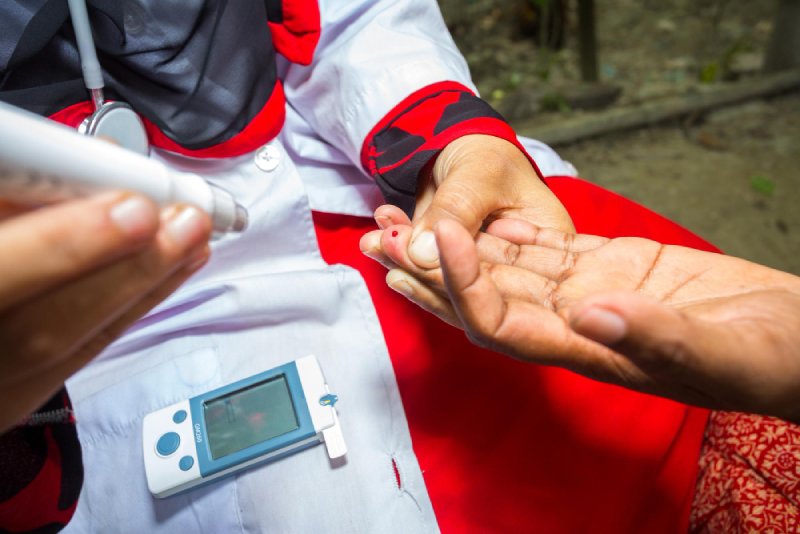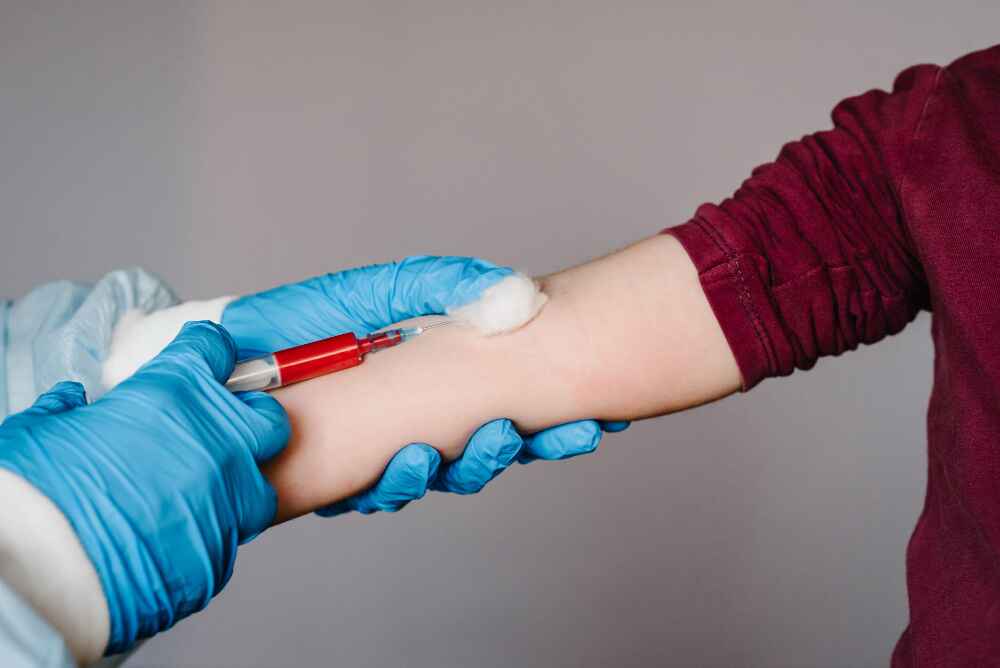Book on Whatsapp
9892101616
The Importance of Blood Tests for Early Disease Detection
Blood Test
Mon Jan 06 2025
A vital component of contemporary medicine, blood tests are essential for the early identification and diagnosis of many illnesses. Healthcare providers can learn important information about a patient's health and identify underlying issues before symptoms manifest by analysing a blood sample. A major benefit of using blood tests for early disease diagnosis is that it can help manage illnesses, improve treatment results, and improve general health. This explains the significance of blood tests for early disease identification.
1. Recognising Hidden Health Concerns
Many illnesses, particularly chronic ones, develop gradually and may not show obvious signs at first. For example, diabetes, high cholesterol, and kidney disease can all develop surreptitiously and often don't exhibit any signs until they are severe. When abnormal levels of lipids, hyperglycemia, or kidney function markers are detected by blood testing, medical practitioners can intervene before the condition reaches a severe stage. Early identification of some disorders can lead to more effective therapy, which can improve quality of life and decrease consequences.
2. Cancer Screening
Even before a tumour can be seen on imaging or when symptoms are not yet evident, some blood tests are made expressly to identify early indicators of cancer. For instance, CA-125 levels can reveal ovarian cancer, and PSA testing can assist in identifying early indicators of prostate cancer. Although blood tests by themselves cannot diagnose a disease, they can lead to other testing like imaging or biopsy that could find cancer in its early stages. Because it greatly improves the likelihood of a successful course of treatment and recovery, early cancer detection is essential.
3. Tracking the Health of Organs
Monitoring the condition of critical organs including the liver, kidneys, and heart also requires blood testing. Abnormalities in these organs, which may suggest the presence of disease, can be found via cardiac indicators, kidney function panels, and liver function tests. For example, aberrant kidney function markers may indicate chronic kidney disease (CKD), while high liver enzyme levels may indicate hepatitis or liver illness. Early detection of these problems enables timely intervention, which may halt or even reverse the progression of organ damage.
4. Evaluating Inflammation and Infections
Blood tests can identify inflammatory diseases and infections that might not have visible signs. While tests for erythrocyte sedimentation rate (ESR) and C-reactive protein (CRP) can reveal underlying autoimmune diseases or inflammation, blood cultures can detect bacterial infections in the circulation. Early detection of infections or inflammatory indicators enables prompt treatment, halting the spread of infections or the onset of long-term illnesses like lupus or rheumatoid arthritis.
5. Avoiding Serious Health Hazards
The risk of heart disease and stroke can be evaluated with the use of routine blood tests, such as blood pressure checks and lipid panels, which measure cholesterol levels. Blood tests enable medical professionals to suggest lifestyle modifications, prescription drugs, or other treatments by identifying high blood sugar or cholesterol levels.
Conclusion
Blood tests are an effective way to detect diseases early on, giving important information that can save lives by spotting problems before they become serious. Frequent blood tests provide a proactive strategy for managing health and averting consequences, whether they are used to detect diabetes, cancer, heart disease, or infections. Blood tests provide prompt interventions, improved treatment results, and eventually a healthier life by identifying illnesses early. Frequent testing can have a major impact on long-term health management and illness prevention, particularly for those with risk factors.
Related Tests
Related Packages
Related Blogs

Blood Test
Cholesterol Levels and What a Lipid Test Reveals
Cholesterol is a waxy, fat-like substance found in every cell of the human body. While it is essential for producing hormones, vitamin D, and substances that aid digestion, an excess of cholesterol in the bloodstream can pose serious health risks. Understanding your cholesterol levels through a lipid test is a crucial step in preventing heart disease, stroke, and other cardiovascular issues.
What Is Cholesterol?
Cholesterol is categorized into two main types: Low-Density Lipoprotein (LDL), often referred to as "bad" cholesterol, and High-Density Lipoprotein (HDL), known as "good" cholesterol. LDL carries cholesterol to your arteries, where it can build up and form plaques, narrowing the arteries and increasing the risk of heart attack and stroke. HDL, on the other hand, helps remove cholesterol from the bloodstream, transporting it back to the liver for excretion.
Another important component is Triglycerides, which are a type of fat found in your blood. When you eat more calories than your body needs, especially from sugar and fat, the excess is converted into triglycerides. High triglyceride levels, along with elevated LDL and low HDL, are linked to an increased risk of cardiovascular disease.
What Is a Lipid Test?
A lipid test, also known as a lipid profile or lipid panel, is a simple blood test that measures the levels of different fats in your blood. Typically, the test includes:
- Total Cholesterol: The overall amount of cholesterol in your blood.
- LDL Cholesterol: Often labelled as “bad” cholesterol because high levels can lead to plaque buildup.
- HDL Cholesterol: Known as “good” cholesterol as it helps remove LDL from the arteries.
- Triglycerides: Elevated levels can raise your risk of heart disease and may indicate metabolic syndrome or diabetes.
The test is usually performed after fasting for 9 to 12 hours, as food intake can temporarily influence lipid levels. Based on the results, your healthcare provider can assess your risk of cardiovascular disease and suggest lifestyle changes or medications if necessary.
Interpreting the Results
Normal lipid levels are typically defined as:
- Total Cholesterol: Less than 200 mg/dL
- LDL Cholesterol: Less than 100 mg/dL
- HDL Cholesterol: 60 mg/dL or higher (considered protective)
- Triglycerides: Less than 150 mg/dL
Borderline or high readings may signal the need for dietary adjustments, increased physical activity, weight management, or in some cases, medication like statins.
Importance of Regular Testing
Regular lipid testing is especially important for individuals over 40, those with a family history of heart disease, people with diabetes, obesity, or a sedentary lifestyle. Early detection of abnormal cholesterol levels can help you take proactive measures to protect your heart and overall health.
Monitoring cholesterol levels through a lipid profile test is a simple yet powerful tool in maintaining cardiovascular health. It offers valuable insights into your risk profile and can guide lifestyle modifications or medical interventions. By keeping cholesterol levels in check, you can significantly reduce your risk of heart disease and lead a healthier, longer life. Regular screening, a balanced diet, regular exercise, and stress management are key to keeping your heart strong and your cholesterol within a healthy range.
Take control of your heart health - test early, stay healthy.

Blood Test
Health Benefits of Blood Donation You Should Know
You may have seen health camps encouraging men and women of eligible ages to donate blood at least once a year. But have you ever wondered—is blood donation actually good for your health?
The answer is a resounding yes.
However, the primary motive of donating blood is to help someone in need, provide them a second chance at life. It is also surprisingly beneficial for the donor. From improving heart health to giving your body a gentle detox, regular blood donation is a simple act that offers powerful returns.
Benefits of blood donation
1. Natural cleanser: Donating blood acts as a natural body cleanser. It affects perfluoroalkyl levels and those of polyfluoroalkyl substances. It reduces skin-related disorders and encourages blood flow. It reduces acne and skin problems.
2. Improves cardiovascular health: Donating blood reduces the chances of cardiovascular issues and heart attacks. It reduces haemoglobin and iron amounts in the body, and blood pressure, and improves blood circulation.
3. Free health check-up: While donating blood at a health camp, you enjoy receiving free health checkups. Healthcare professionals understand your health vitals before the procedure. They test blood pressure and haemoglobin levels. You don’t have to pay for these checkups.
4. Promotes hair growth: After donation, the body produces new blood cells. It stimulates hair follicles while boosting new hair growth.
5. Screening infections and diseases: Health professionals screen your body to identify infectious diseases. It is a mandatory step. They test blood for a variety of diseases, including HIV, virus, malaria, etc.
6. Save lives: By donating blood, you get the opportunity to save precious lives. It includes cancer patients and those suffering from burns or traumatic injuries. You obtain their blessings.
What to do and avoid before and after blood donation?
- Have iron-rich food: Avoid fatty, unhealthy meals. They promote new blood cells.
- Pain relievers or blood thinners: Avoid them before donating blood.
- Get sufficient sleep: Take rest before donating blood. Be relaxed and avoid panic on blood donation day.
- Avoid drinking and smoking: Practice this at least two days before donating blood, as it could increase blood pressure. Moreover, it might reduce the amount in the blood.
- Avoid straining yourself: Performing rigorous exercises after donating blood should be avoided. Do not consume alcohol, smoke, or drugs for a day.
- Rest: After donating blood, A healthcare professional will supervise you. Do not lift heavy weights or perform strenuous physical activities for about hours.
Enjoy the selfless deed!

Blood Test
5 Routine Blood Tests That Help Detect Health Issues Early
Monitoring your health routinely with blood tests is one of the simplest ways to identify an issue before it becomes serious. Blood tests are helpful in providing valuable information about your body's function and can reveal areas of concern. If you're habitual in your routine check-ups, you can effectively make decisions that will benefit your health down the road.
Here are five blood tests worth noting that can help highlight health issues early on.
1. Complete Blood Count (CBC)
A Complete Blood Count, or CBC, is a standard test that looks at several components of your blood, such as red blood cells, white blood cells, and platelets. It can reveal infections, anemia, immune system disorders, and blood cancers.
Even if you feel fine, some health care providers suggest having a CBC once a year because it is part of a regular health screening. Diagnostic centers you trust, like manipaltrutest.com, offer fast, accurate, and high quality CBC tests to help you to be proactive about your health risks.
2. Blood Sugar Test
Elevated blood glucose can lead to diabetes, which can eventually lead to heart, kidney, eye, and nerve damage if lost to detection. For example, a simple fasting blood sugar test or HbA1c test provides a picture of your blood sugar control through time.
Preventing long-term complications is possible if you are diagnosed early with a blood sugar test. It will allow you to make lifestyle changes or take treatment when necessary to lower your blood sugar. If you have a family history of diabetes, then it is even more important to have your blood sugars tested regularly.
3. Lipid Profile
A lipid profile measures the levels of cholesterol and triglycerides in your blood. High cholesterol is a major risk factor for heart disease and stroke. This test checks your total cholesterol, good (HDL) cholesterol, bad (LDL) cholesterol, and triglycerides.
With early detection, you can take action by adjusting your diet, exercising more, or taking prescribed medications. Health centers offer complete lipid profile tests with clear reports and expert guidance.
4. Liver Function Test (LFT)
The liver is an important organ needed for digesting food, storing energy, and removing toxins. A Liver Function Test (LFT) will check for enzymes and proteins that can indicate how well your liver is functioning. Abnormal test results can indicate infections such as hepatitis, liver damage from alcohol or other underlying medical conditions. A regular LFT is critical, as often liver problems do not manifest any symptoms in their early stages. Regardless of whether or not you feel any pain, having your liver function checked now and again gives you peace of mind and could save your life. For peace of mind, consider having this test done once a year.
5.Thyroid Function Test
The thyroid controls your metabolism, energy, among other functions in the body. A Thyroid Function Test examines hormone levels such as T3, T4, and TSH to determine if your thyroid is underactive (hypothyroidism) or overactive (hyperthyroidism). Symptoms such as exhaustion, mysterious weight gains or losses, or mood changes could indicate a thyroid issue. Testing your thyroid health sooner rather than later allows you the opportunity to address and prevent complications that hinder your health and wellness.
Testing services such as Manipal TRUtest gives you the peace of mind of knowing that an reputable provider will have your results into the system quickly and efficiently, so you can continue to monitor your health.
Routine blood tests represent more than measurement of numbers on a report, they give a clearer picture of what is happening inside your body. Identifying health problems at the early stages can empower you with choices for your treatment; putting you in control and giving you a better chance of a longer healthier life.
When you choose to make routine health screenings a regular feature of your health through initiatives such as manipaltrutest.com, you are taking a step towards your health and a better future with less worry.
